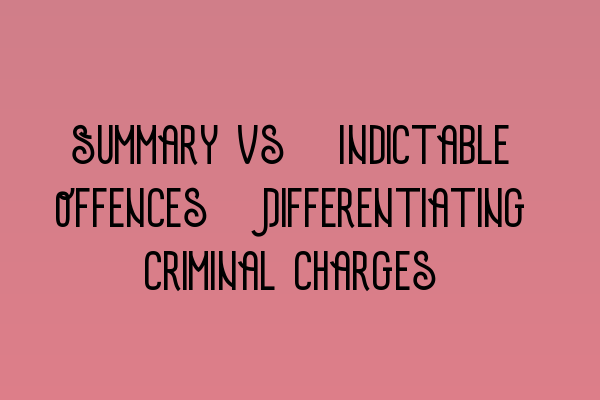Summary vs. Indictable Offences: Differentiating Criminal Charges
When it comes to criminal charges in the UK, offenses are typically classified as either summary or indictable. Understanding the difference between the two is crucial for both legal professionals and individuals involved in criminal cases. In this article, we will break down the characteristics and distinctions of summary and indictable offences to help you gain a better understanding.
Summary Offences
A summary offense, also known as a summary-only offence, is a less serious criminal offense that is dealt with in a magistrates’ court. These offenses are usually minor in nature and include offenses such as petty theft, disorderly conduct, and certain traffic violations. Summary offenses are typically punishable by fines, community service, or short custodial sentences.
One key characteristic of a summary offense is that it cannot be tried by a jury. The trial is conducted by a magistrate, who is a qualified legal professional in the magistrates’ court. The procedures for summary offenses are relatively simple and streamlined, as they are designed to handle less complex cases efficiently.
It is important to note that summary offenses have a shorter time limitation for prosecution compared to indictable offenses. This means that the prosecution must commence within a certain timeframe, known as the statute of limitations, after the offense has been committed.
Indictable Offences
Indictable offenses, on the other hand, are more serious criminal charges that require a trial in the Crown Court. These offenses include crimes such as murder, robbery, sexual offenses, and complex fraud cases. Indictable offenses tend to involve significant harm or threat to individuals or society and carry heavier penalties, including longer prison sentences.
Unlike summary offenses, indictable offenses can be tried by a jury. The jury consists of a group of ordinary citizens who listen to the evidence presented by both the prosecution and the defense and determine the guilt or innocence of the accused. The trial procedures for indictable offenses are typically more complex and formal, given the gravity of the charges.
Indictable offenses have a longer time limitation for prosecution compared to summary offenses. This is because these types of offenses often require more time for investigation and preparation before the trial can take place. It is essential to understand the statute of limitations specific to each indictable offense to ensure that legal proceedings are initiated within the prescribed timeframe.
Differentiating Summary and Indictable Offences
While the definitions and procedures for summary and indictable offenses may seem distinct, it is important to note that certain offenses can be dealt with either summarily or by indictment, depending on the circumstances and severity of the case. These offenses are referred to as triable-either-way offenses. Examples of triable-either-way offenses include theft, assault causing actual bodily harm, and certain drug offenses.
For triable-either-way offenses, the defendant will have the opportunity to choose whether they wish to be tried in the magistrates’ court (summary trial) or the Crown Court (indictable trial). The decision is based on various factors, including the potential penalties, complexity of the case, and personal preferences.
In cases where the defendant chooses summary trial for a triable-either-way offense, the magistrates’ court will conduct the trial unless the case is considered too complex or serious, in which case it may be transferred to the Crown Court. On the other hand, if the defendant chooses an indictable trial, the case will automatically be sent to the Crown Court.
Conclusion
In summary, understanding the difference between summary and indictable offenses is crucial for legal professionals and individuals involved in criminal cases. Summary offenses are less serious offenses dealt with in magistrates’ court, while indictable offenses are more serious charges requiring trial in the Crown Court. However, certain offenses can be dealt with either summarily or by indictment, depending on the circumstances of the case.
For further information and resources on criminal law and practice in the UK, you may find the following articles helpful:
